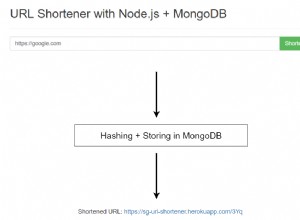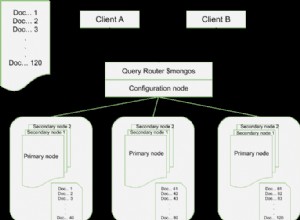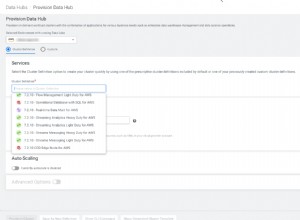"async " è un modulo molto popolare per eliminare i cicli asincroni e rendere il codice più facile da leggere/mantenere. Ad esempio:
var async = require('async');
function getHonorStudentsFrom(stuObjList, callback) {
var honorStudents = [];
// The 'async.forEach()' function will call 'iteratorFcn' for each element in
// stuObjList, passing a student object as the first param and a callback
// function as the second param. Run the callback to indicate that you're
// done working with the current student object. Anything you pass to done()
// is interpreted as an error. In that scenario, the iterating will stop and
// the error will be passed to the 'doneIteratingFcn' function defined below.
var iteratorFcn = function(stuObj, done) {
// If the current student object doesn't have the 'honor_student' property
// then move on to the next iteration.
if( !stuObj.honor_student ) {
done();
return; // The return statement ensures that no further code in this
// function is executed after the call to done(). This allows
// us to avoid writing an 'else' block.
}
db.collection("students").findOne({'_id' : stuObj._id}, function(err, honorStudent)
{
if(err) {
done(err);
return;
}
honorStudents.push(honorStudent);
done();
return;
});
};
var doneIteratingFcn = function(err) {
// In your 'callback' implementation, check to see if err is null/undefined
// to know if something went wrong.
callback(err, honorStudents);
};
// iteratorFcn will be called for each element in stuObjList.
async.forEach(stuObjList, iteratorFcn, doneIteratingFcn);
}
Quindi potresti usarlo in questo modo:
getHonorStudentsFrom(studentObjs, function(err, honorStudents) {
if(err) {
// Handle the error
return;
}
// Do something with honroStudents
});
Tieni presente che .forEach() chiamerà la tua funzione iteratore per ogni elemento in stuObjList "in parallelo" (cioè, non aspetterà che una funzione iteratore finisca di essere chiamata per un elemento dell'array prima di chiamarlo sull'elemento dell'array successivo). Ciò significa che non è possibile prevedere l'ordine in cui verranno eseguite le funzioni dell'iteratore o, cosa più importante, le chiamate al database. Risultato finale:imprevedibile ordine d'onore degli studenti. Se l'ordine è importante, utilizza .forEachSeries() funzione.




